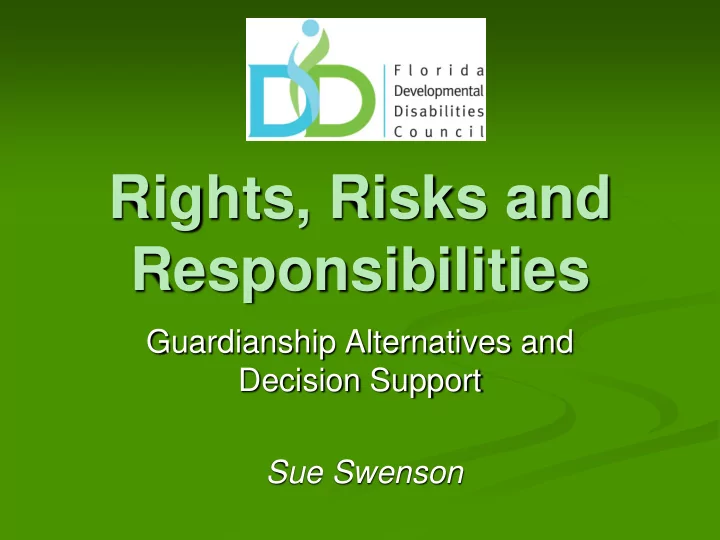

Rights, Risks and Responsibilities Guardianship Alternatives and Decision Support Sue Swenson
Full disclosure: I am a mother I am not a lawyer There are many informational resources on the web Other parents are a source of wisdom Sue.swenson@gmail.com
The Struggle for Rights of People with Disabilities Deficit, difference and deviance Eugenics Institutionalization, segregation Normalization Program, plan, readiness Equality and inclusion
Emerging Rights of People with Disabilities Human rights movement Parent movement Civil rights movement Disability movement Self-advocacy
Some Statements of Rights Developmental Disabilities Services and Bill of Rights Act Americans with Disabilities Act Olmstead S.C. Decision IDEA, Rehab Act Montreal Declaration on the Rights of People with Intellectual Disabilities in Health Care UN Convention on the Rights of People with Disabilities
Whose life is it, anyway? The right to diagnosis and treatment The right to due process The right to services and supports The right to safety and security The right to live in the world The right to belong
What are the risks? As parents, we worry about . . . Health status Accidents and injuries Abuse and neglect Loneliness and isolation Violence and crime
The Dignity of Risk “Overprotection may appear on the surface to be kind, but it can be really evil.” Robert Perske
The Duty of Love “It is true we can seldom help those closest to us. Either we don't know what part of ourselves to give or more often than not, the part we have to give is not wanted. . . We can love completely, without complete understanding.” -- Norman Maclean, A River Runs Through It
Kinds of decisions Personal, individual Color of room Style of clothing Favorite music Favorite foods What to do for fun Whom to love Whom to trust
Kinds of decisions Advice from friends What movie to see Whom to date How to stand up to parents Whether to have sex Whether to quit a job How to handle a rough situation
Kinds of decisions Expert advice When to have surgery How to be healthier Whether to marry How to handle money Help with plans and contracts
We All Use Decision Support When we use experts like lawyers, doctors or accountants. When we seek advice from friends and family. When we seek counsel from wise people such as clergy members.
So . . . . . . Why should people with disabilities need a guardian just because they can’t manage alone?
Models of decision support From least to most restrictive From temporary to permanent From specific to plenary . . . With a goal of preserving rights
Supported decision-making Use accommodations and supports For decisions For communication Use more accommodation for more important or difficult decisions Allow for choice Allow for trust Allow for relationships
Person-centered thinking Circles of support Shared decision-making The right support for the right task Try to understand Be open to questions Strengths and support needs Dreams and nightmares
Support choices Early in life: talk about why It’s never too late Learn to listen Develop your confidence Encourage others to participate
Other strategies Power of attorney For specific purposes such as health care Given by the person; may be taken back State specific May need a lawyer Special needs trust Fund what is important to you Fund what is important to the person May be pooled (WA is state-sponsored) Get a lawyer
Other strategies Representative payee for financial management See your bank Use technology To connect and communicate To supplement information To understand outcomes of decisions
A new way of thinking Guardianship, at one time seen as a benign way to "protect" people with disabilities, is now seen as an intrusion into a person's basic civil and human rights and a legal process to be avoided. -- Hoyle and Harris, Alternatives to Guardianship
Why Guardianship? Questions of custody or legal status History of guardianship Breakdown of supports No exposure to alternatives Legal or financial advice
Duties of the Guardian Work within state law and scope of guardianship order Consider the values and preferences of the individual Encourage participation of individual and help him or her regain capacity Minimize restrictions (choose LRE)
Some reading and resources State Bar Association websites on Powers of 1. Attorney and Guardianship. National Guardianship Association Standards 2. of Practice www.guardianship.org Person-centered planning, The Quality Mall 3. www.qualitymall.org “Re-thinking Guardianship,” Dohn Hoyle and 4. Kathleen Harris “The Dignity of Risk,” Robert Perske 5.
Recommend
More recommend